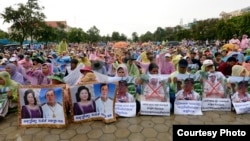The NGO Forum says in 2014 economic land concessions—granted to companies by the government—were behind a third of all land disputes in the country, affecting more than 17,000 households, or nearly 80,000 people.
The report, “Statistical Analysis of Land Disputes,” issued Tuesday, examined records of land disputes for all of last year. It found that Phnom Penh had the highest number, followed by Ratanakkiri province. The main cause, land concessions, led to increased poverty to local residents, the research shows.
A typical story is one from Yong Rann, who was embroiled in a land dispute in 2010, losing her land to an economic land concession. “Since the company occupies my land, I no longer do farming on my land,” she said. “I hope they stop clearing my land, and I hope they give me back my land.”
Tek Vannara, executive director of the NGO Forum, said that to address ongoing land disputes, the government must provide more support to victims, so that they, too, can benefit from development.
E Bunthoeun, vice president of the committee to resolve land disputes, under the Ministry of Land Management, said the ministry hopes to resolve these problems through issuing land titles to people. So far, 2 million hectares of land have been titled to villagers, while the committee has made visits “directly to the conflict zones,” he said.
Meanwhile, the government has undertaken a review of its land concession policy, reducing the lease period from 99 year to 50 years for some projects. Still, many villagers remain displaced, out of work or otherwise affected by ongoing land disputes, which have emerged in the past decade as a major policy problem for the country.








